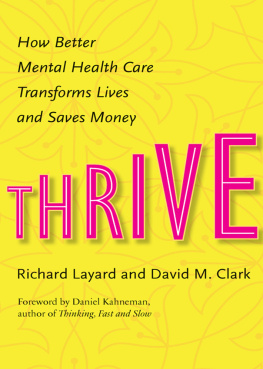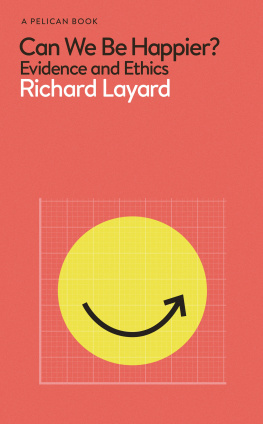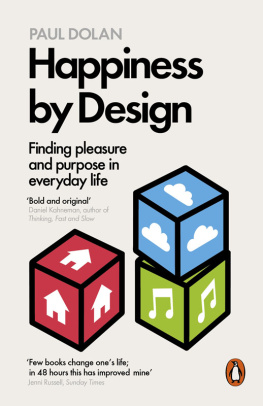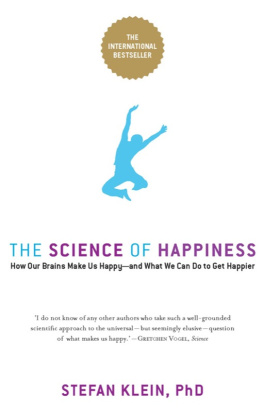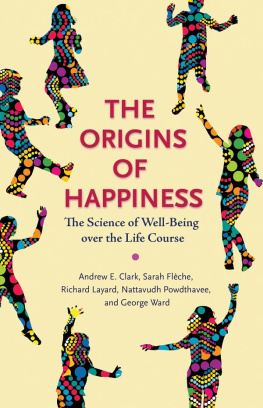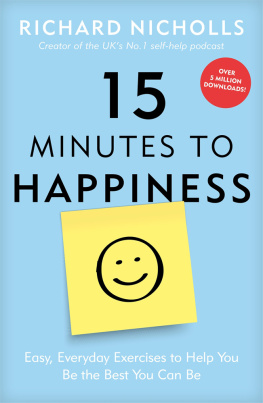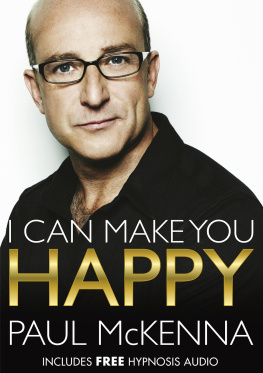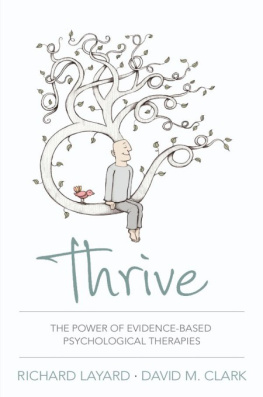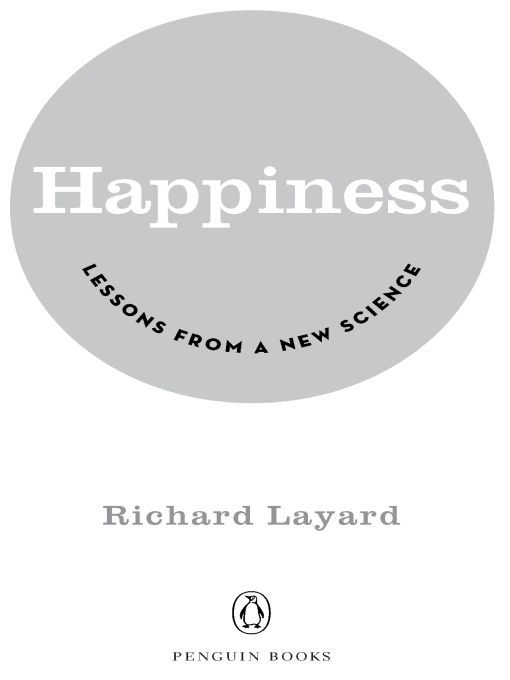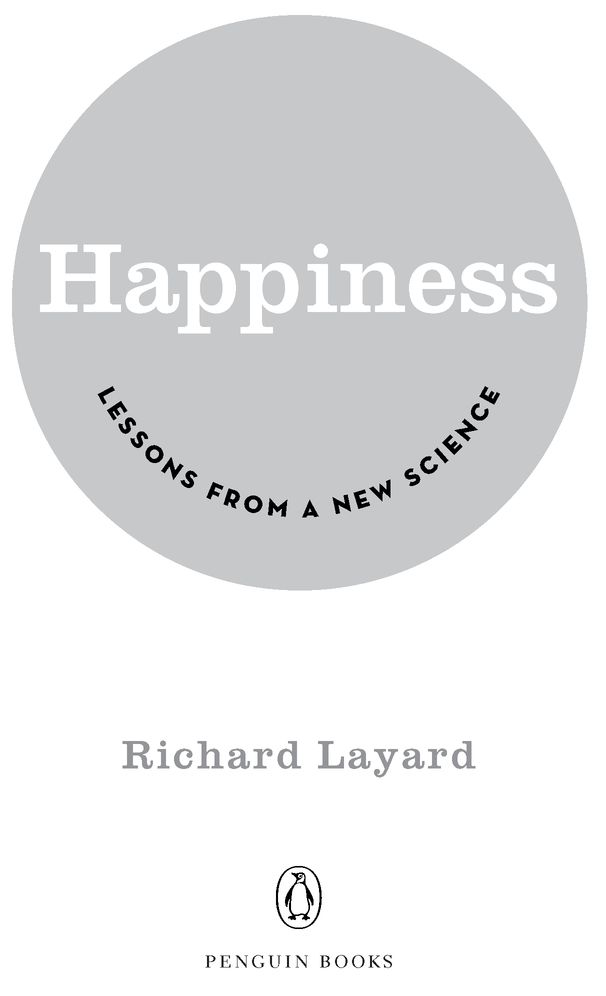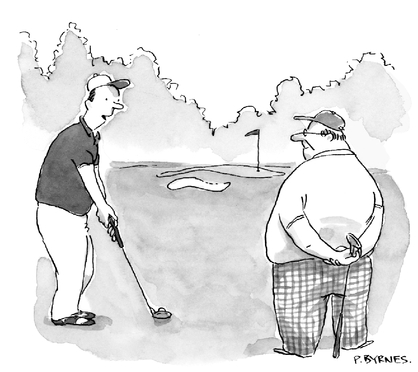Table of Contents
Praise for Richard Layards Happiness
Mr. Layard, a highly regarded British economist and pioneer in the new field of happiness studies, proves both halves of his equation quite satisfactorily in this engaging, if inevitably controversial work.Roger Miller, The Washington Times
A breathtaking interdisciplinary journey into the causes and consequences of happiness written by an economist with a fervent dedication to using scientific data for the public good. From neuroscience to economics, Lord Layard shows us the landscape of this science and why happiness should be taken seriously. A must-read for anyone interested in this topic.
Richard J. Davidson, William James and Vilas Research Professor of Psychology and Psychiatry, and director of the Laboratory for Affective Neuroscience, University of Wisconsin-Madison
ABOUT THE AUTHOR
Richard Layard is one of Britains best-known economists and a world expert on unemployment and inequality. He founded Europes leading economics research center within the London School of Economics. He worked for the British government as an economic adviser from 1997 to 2001, and in 2000 he became a member of the House of Lords. He is the author of a number of academic books.
To Daniel Kahneman
fearless explorer
Preface
I am an economistI love the subject and it has served me well. But economics equates changes in the happiness of a society with changes in its purchasing poweror roughly so. I have never accepted that view, and the history of the last fifty years has disproved it. Instead, the new psychology of happiness makes it possible to construct an alternative view, based on evidence rather than assertion. From this we can develop a new vision of what lifestyles and what policies are sensible, drawing on the new psychology, as well as on economics, brain science, sociology and philosophy.
The time has come to have a goto rush in where angels fear to tread. So here is my effort at a new evidence-based vision of how we can live better. It will need massive refinement as our knowledge accumulates. But I hope it will hasten the shift to a new perspective, where peoples feelings are treated as paramount. That shift is overdue.
So many people have helped in this book and helped so generously that I describe their role in a separate note at the end. I have been helped by psychologists, neuroscientists, sociologists, philosophers and of course economistsall sharing a desire for human betterment.
If the book does anything, I hope it creates a bit more happiness.
Richard Layard
LONDON, JULY 2004
PART I
The Problem
Researchers say Im not happier for being richer, but do you know how much researchers make?
CHAPTER 1
Whats the problem?
Noughts had, alls spent,
Where our desire is got without content.
LADY MACBETH
There is a paradox at the heart of our lives. Most people want more income and strive for it. Yet as Western societies have got richer, their people have become no happier.
This is no old wives tale. It is a fact proven by many pieces of scientific research. As Ill show, we have good ways to measure how happy people are, and all the evidence says that on average people are no happier today than people were fifty years ago. Yet at the same time average incomes have more than doubled. This paradox is equally true for the United States and Britain and Japan.
But arent our lives infinitely more comfortable? Indeed: we have more food, more clothes, more cars, bigger houses, more central heating, more foreign holidays, a shorter working week, nicer work and, above all, better health. Yet we are not happier. Despite all the efforts of governments, teachers, doctors and businessmen, human happiness has not improved.
This devastating fact should be the starting point for all discussion of how to improve our lot. It should cause each government to reappraise its objectives, and every one of us to rethink our goals.
One thing is clear: once subsistence income is guaranteed, making people happier is not easy. If we want people to be happier, we really have to know what conditions generate happiness and how to cultivate them. That is what this book is aboutthe causes of happiness and the means we have to affect it.
If we really wanted to be happier, what would we do differently? We do not yet know all the answers, or even half of them. But we have a lot of evidence, enough to rethink government policy and to reappraise our personal choices and philosophy of life.
The main evidence comes from the new psychology of happiness, but neuroscience, sociology, economics and philosophy all play their part. By bringing them together, we can produce a new vision of how we can live better, both as social beings and in terms of our inner spirit.
What Philosophy?
The philosophy is that of the eighteenth-century Enlightenment, as articulated by Jeremy Bentham. If you pass below the fine classical portico of University College London, you will find him there near the entrance hallan elderly man dressed in eighteenth-century clothes, sitting in a glass case. The clothes are his and so is the body, except for the head, which is a wax replica. He is there because he inspired the founding of the college, and as he requested, he still attends the meetings of the College Council, being carried in for the purpose. A shy and kindly man, he never married, and he gave his money to good causes. He was also one of the first intellectuals to go joggingor trotting as he called itwhich he did until near his death. But despite his quirks, Bentham was one of the greatest thinkers of the Enlightenment.
The best society, he said, is one where the citizens are happiest. So the best public policy is that which produces the greatest happiness. And when it comes to private behaviour, the right moral action is that which produces the most happiness for the people it affects. This is the Greatest Happiness principle. It is fundamentally egalitarian, because everybodys happiness is to count equally. It is also fundamentally humane, because it says that what matters ultimately is what people feel. It is close in spirit to the opening passages of the American Declaration of Independence.
This noble ideal has driven much of the social progress that has occurred in the last two hundred years. But it was never easy to apply, because so little was known about the nature and causes of happiness. This left it vulnerable to philosophies that questioned the ideal itself. In the nineteenth century these alternative philosophies were often linked to religious conceptions of morality. But in the twentieth century religious belief diminished, and so eventually did belief in the secular religion of socialism. In consequence there remained no widely accepted system of ethical belief. Into the void stepped the non-philosophy of rampant individualism.
At its best this individualism offered an ideal of self-realisation. But that gospel failed. It did not increase happiness, because it made each individual too anxious about what he could get for himself. If we really want to be happy, we need some concept of a common good, towards which we all contribute.


